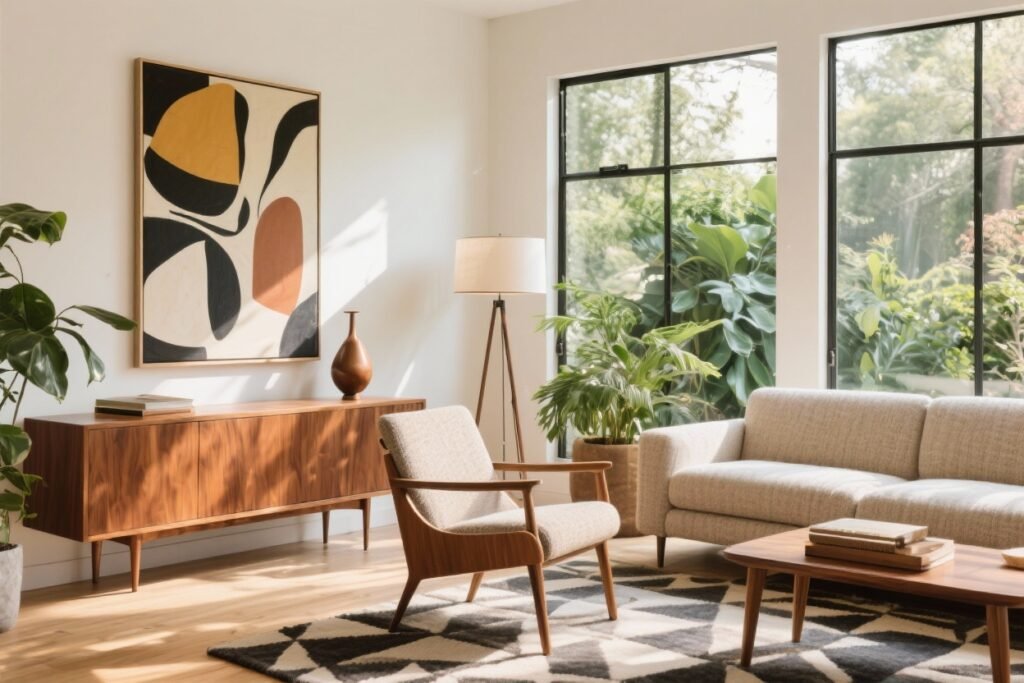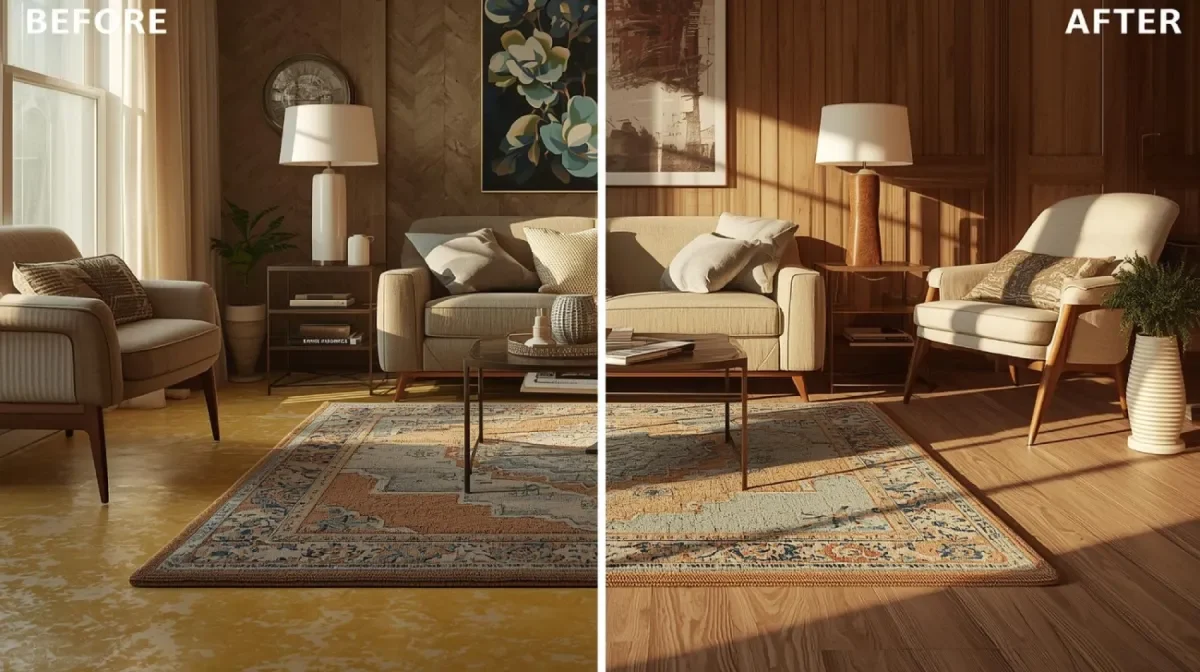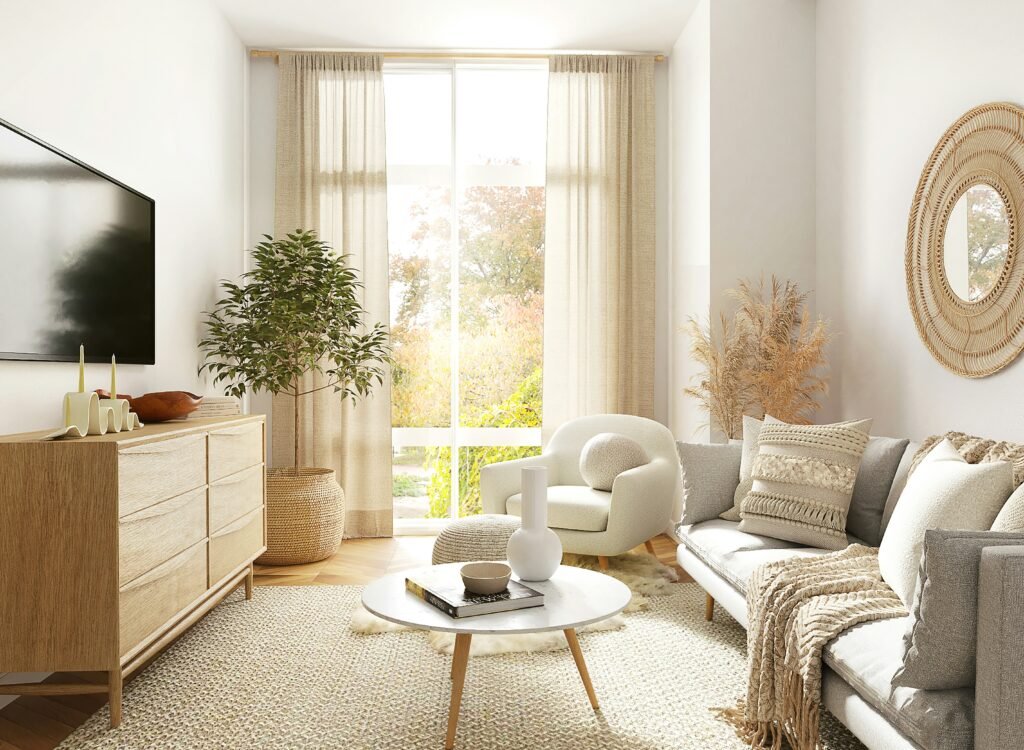Ready for a room glow-up? Mid-century design has never really gone out of style—but today it’s getting a modern twist. This post brings you 12 modern mid-century ideas that feel crisp, cozy, and completely livable. Think sculptural lines, warm woods, and vintage-inspired details paired with textures and palettes that make sense for today’s homes.
Each room concept is a complete, distinct design you can copy or adapt to fit your space. Whether you’re styling a cozy mid century modern living room, refreshing your kitchen with subtle teak accents, or creating a calming bedroom retreat, these ideas show how to capture timeless mid-century charm without slipping into “museum” mode.
Sunlit Walnut Lounge with Sculptural Lines

Sunlit Walnut Lounge with Sculptural Lines
This design works as modern mid-century because it blends the movement’s timeless hallmarks—warm woods, clean lines, and sculptural forms—with a fresh, livable edge. It doesn’t feel like a set piece from the 1960s, but a space you actually want to curl up in today.
-
Warm Walnut Base: Rich walnut furniture has always been a mid-century staple. Here, the walnut sofa frame and coffee table ground the room, while camel leather cushions lighten the mood and make the setup approachable.
-
Sculptural Furniture: The kidney-shaped coffee table and tripod floor lamps showcase iconic mid-century silhouettes. They add artistic presence without making the room feel over-designed.
-
Neutral + Earthy Palette: Crisp white walls and a cream wool rug create a clean backdrop, while olive green pillows and matte black lamps introduce depth. This balance keeps the palette sophisticated but warm.
-
Minimal Styling: A bold line drawing, stacked design books, and a sculptural ceramic bowl keep the look curated but not cluttered—exactly the restraint that defines mid-century style.
Key takeaway: The lounge feels rooted in mid-century tradition yet updated for modern life—proof that sculptural lines, walnut wood, and a few intentional accents can create a glow-up that’s both timeless and fresh.
Charcoal + Brass Conversation Den
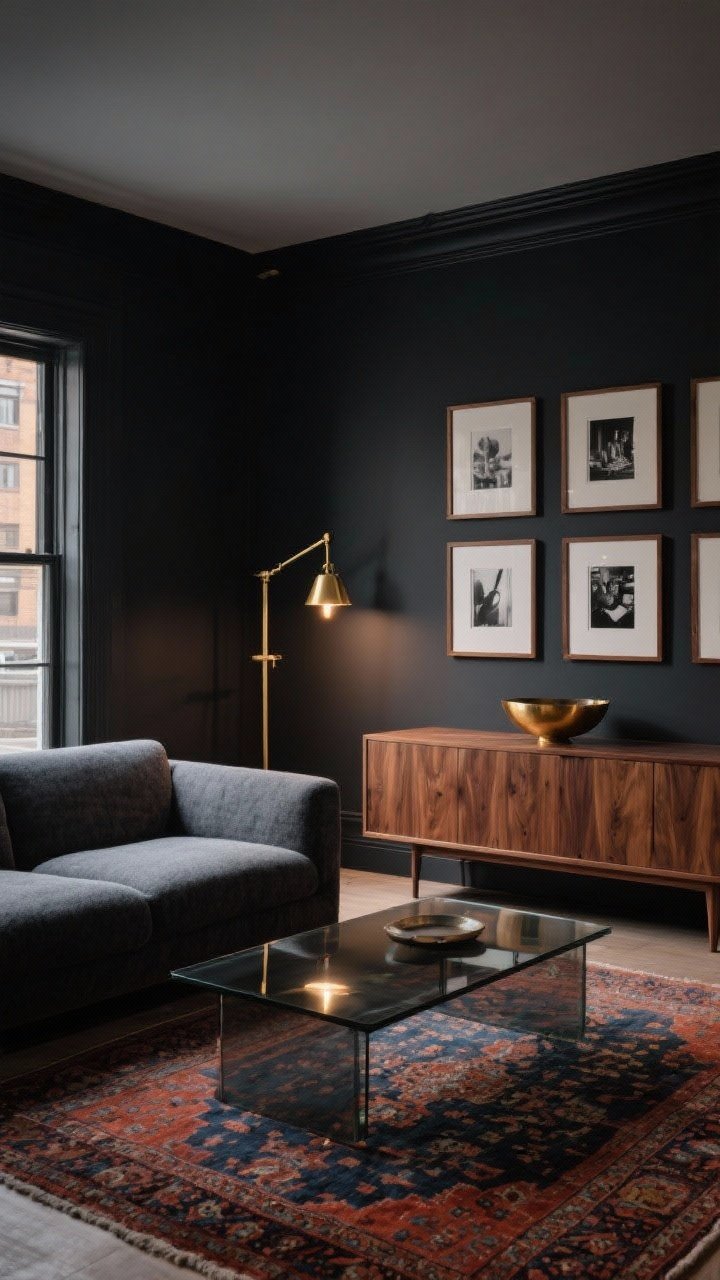
This design works as modern mid-century because it leans into the movement’s love of contrast—moody hues, warm metallics, and natural wood—while layering in texture for depth. It feels rich and dramatic but still approachable for everyday living.
-
Charcoal Backdrop: Painting the walls charcoal instantly sets a cocoon-like atmosphere. Mid-century palettes often explored darker tones, and using it here makes brass, teak, and fabric textures pop.
-
Brass Accents: Brass sconces and a sculptural bowl bring in warmth and light-reflecting shine. Metallic details were a defining feature of mid-century spaces, adding a touch of glamour without excess.
-
Layered Surfaces: A smoked glass coffee table and low-pile Persian rug balance sleekness with softness. This push-pull between hard and soft materials is what keeps the look cozy, not cold.
-
Classic Furniture: The deep sectional grounds the room, while the teak credenza and walnut frames reference the clean-lined furniture silhouettes mid-century design is built on.
-
Art That Anchors: Black-and-white photography ties the palette together, while also echoing the graphic, minimalist artwork popular in the mid-century period.
Key takeaway: The mix of moody charcoal, gleaming brass, and timeless wood tones creates a space that’s dramatic but still livable—a modern interpretation of mid-century sophistication.
Creamy Kitchen with Teak Accents

This design works as modern mid-century because it takes the clean geometry and warm wood tones of the style and translates them into a kitchen that feels fresh, airy, and functional. It honors mid-century’s love of simplicity while keeping the space practical for daily life.
-
Light, Neutral Base: Matte cream cabinetry paired with slim brass pulls creates a soft, bright backdrop. Neutral tones like these were staples of mid-century interiors, but here they’re updated for today’s preference for open, light-filled kitchens.
-
Teak Warmth: A teak-paneled island adds a natural, warm element that keeps the space from feeling too stark. Teak is a quintessential mid-century wood, known for both its durability and its rich tone.
-
Streamlined Surfaces: White quartz countertops with a pencil edge stay sleek and minimal, aligning with mid-century’s focus on clean-lined functionality.
-
Iconic Lighting: Opalescent globe pendants are instantly recognizable mid-century icons. Their soft glow balances the sharp lines of cabinetry and countertops.
-
Everyday Functionality: Woven leather bar stools, a walnut cutting board, and a ceramic fruit bowl layer in texture and usability. These small but tactile details keep the kitchen lived-in rather than purely styled.
Key takeaway: By combining creamy neutrals, warm teak, and subtle mid-century accents like globe lighting, this kitchen proves the style can feel bright, modern, and effortlessly usable every day.
Graphite Office with a Floating Desk
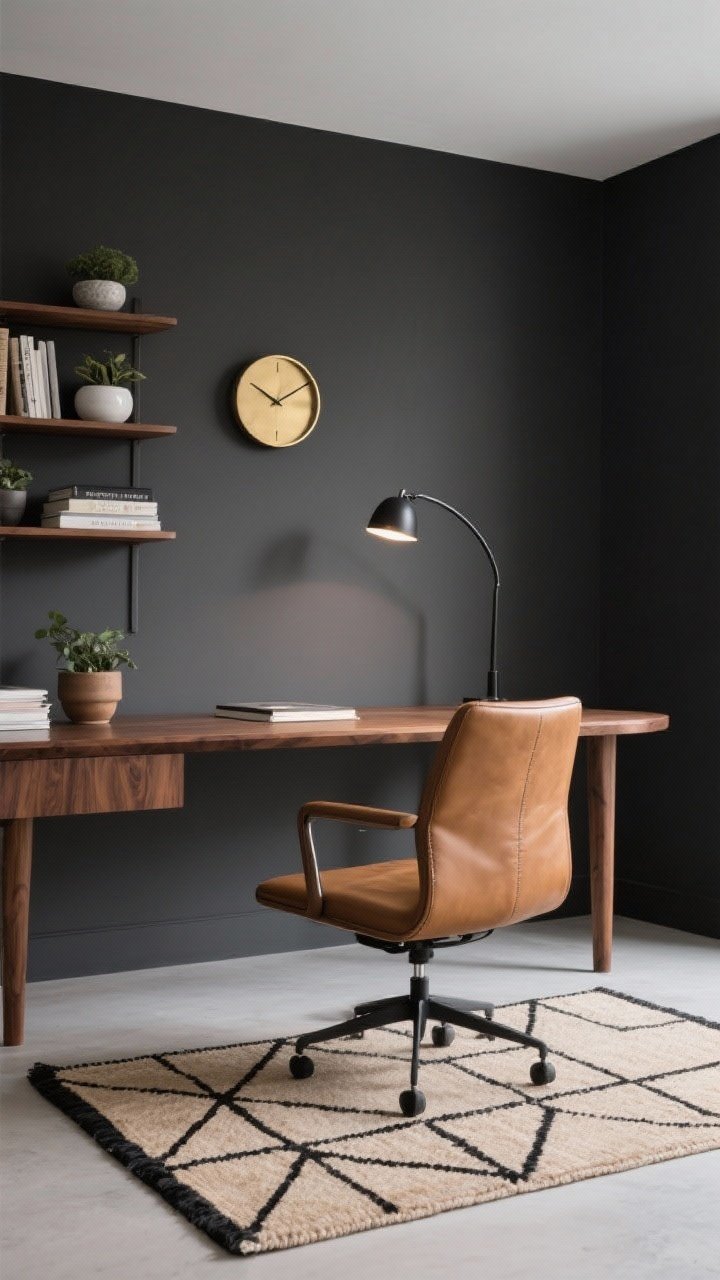
This design works as modern mid-century because it mixes bold, moody color with streamlined furniture and sculptural lighting—hallmarks of the style that also create a focused, contemporary workspace. It’s a balance of form and function that feels both sharp and inviting.
-
Moody Walls: A deep graphite backdrop gives the office instant sophistication. Dark walls were often used in mid-century interiors to create contrast and highlight wood tones, and here they set the stage for the floating desk.
-
Streamlined Desk: The walnut floating desk with rounded corners captures mid-century’s love of organic lines and practical design. Its wall-mounted style frees up floor space, keeping the room uncluttered.
-
Functional Seating: The camel leather swivel chair brings in warmth and comfort while nodding to iconic mid-century materials. It pairs function with a sculptural silhouette that elevates the workspace.
-
Geometric Anchors: A sand-and-black flatweave rug grounds the area with a subtle pattern, echoing mid-century geometric motifs without overwhelming the space.
-
Curated Accents: Slim arc and task lamps provide clean, directional light. Open walnut shelves with planters and books keep the styling minimal but intentional. A brass clock adds that subtle metallic glint the style is known for.
Key takeaway: With its dark backdrop, sculptural desk, and clean-lined accents, this office shows how mid-century design principles can create a work zone that’s functional, stylish, and deeply focused.
Earthy Bedroom with Low Lines

This design works as modern mid-century because it embraces simplicity, grounded furniture, and natural tones to create a restful retreat. Mid-century bedrooms were never overly ornate—they relied on low silhouettes, organic textures, and earthy palettes to evoke calm, and this space follows suit in a modern way.
-
Low Profile Bed: The walnut platform bed with rounded corners is classic mid-century: functional, minimal, and organic in form. Its low height naturally creates a sense of calm and stability, perfect for a bedroom.
-
Natural Textiles: Ecru linen bedding with a moss-colored throw layers soft, breathable textures that tie directly into mid-century’s connection to nature. Linen and wool were common materials, updated here with a fresh earthy palette.
-
Balanced Lighting: A cone-shaped ceramic pendant on one side and a globe lamp on the other deliver the mix-and-match lighting mid-century design encouraged. Each piece brings sculptural presence without overwhelming the room.
-
Earthy Warmth: Terracotta curtains add warmth and dimension against the muted backdrop, while the oversized oil landscape ties the palette together with soft greens and neutrals.
-
Softened Grounding: A nubby ivory rug underfoot provides texture and comfort, echoing the tactile focus mid-century spaces are known for.
Key takeaway: By keeping the bed low, the palette earthy, and the styling minimal, this bedroom captures mid-century’s essence—calm, grounded, and connected to nature—while still feeling fresh for modern living.
Playful Pebble-Tone Dining Nook

This design works as modern mid-century because it celebrates the era’s playful side—mixing iconic furniture shapes, soft color variation, and graphic wall art—while still feeling fresh and approachable. It’s sophisticated but never too serious, which is exactly why it fits today’s homes.
-
Iconic Table Shape: The white pedestal tulip table is mid-century royalty. Its smooth, sculptural base eliminates visual clutter, making small dining nooks feel more open.
-
Pebble Palette Chairs: Molded plastic chairs in soft pebble shades—stone, dove, and fog—bring subtle color variation that nods to mid-century experimentation with pastels and neutrals. They’re lightweight, functional, and timeless.
-
Warm Neutral Walls: A warm white backdrop keeps the palette clean and ensures the furniture takes center stage, echoing the mid-century principle of letting form do the talking.
-
Graphic Artwork: A grid of vintage botanical prints in slim black frames brings rhythm and order to the walls while adding a dash of nostalgia. This layering of nature-inspired art was a common motif in mid-century homes.
-
Cozy Accents: Mustard and slate pillows layered on a bench or window seat soften the look. Pops of color were always part of the style’s DNA, but here they’re kept restrained for a modern update.
Key takeaway: With its iconic tulip table, soft-toned chairs, and graphic yet playful styling, this nook proves mid-century design can be cheerful, compact, and full of personality—without losing sophistication.
Desert Modern Living Room with Soft Geometry

This design works as modern mid-century because it leans into the era’s love of organic shapes, earth-inspired palettes, and sculptural simplicity—while keeping the vibe warm and livable. The desert tones feel rooted in nature, which keeps the look timeless instead of trendy.
-
Organic Seating Shapes: A sand-colored sofa paired with a clay-toned curved accent chair shows mid-century’s emphasis on comfort through form. Rounded silhouettes feel both soft and modern, a hallmark of the style.
-
Sculptural Coffee Table: An oval travertine table with tapered oak legs adds the stone-and-wood balance that defines mid-century design. It’s sleek, functional, and grounded in natural materials.
-
Earth-Toned Walls: Painting one wall adobe blush while keeping the rest off-white gives depth without overpowering the room. Mid-century palettes often played with accent walls to highlight architecture and furniture.
-
Textured Grounding: A jute-and-wool rug with simple geometric patterns brings texture underfoot, echoing mid-century’s love of tactile surfaces that don’t compete with furniture lines.
-
Nature as Decor: A tall cactus in a terracotta pot ties the room back to the desert inspiration. Mid-century interiors often blurred indoors and outdoors, and plants are still one of the easiest ways to channel that ethos.
-
Mood Lighting: Brass cone sconces provide warm evening glow, reinforcing the mix of matte metal and earthy tones that keeps the design cohesive.
Key takeaway: By layering rounded furniture, natural textures, and a warm desert-inspired palette, this living room captures mid-century’s sculptural elegance while feeling inviting enough for everyday lounging.
Minimal Black-and-Wood Entry with Bench Moment

This design works as modern mid-century because it uses clean geometry, functional furniture, and a restrained palette to make a small space impactful. Mid-century design always prized practicality, and here it shines in a streamlined entryway that’s stylish but never overdone.
-
Functional Anchor: The walnut slat bench is the hero piece. Benches were a staple in mid-century interiors—practical for sitting, storing, or styling—while their slatted designs add rhythm and texture.
-
Balanced Contrast: A round black-framed mirror above the bench brings the bold contrast mid-century is known for. The simple circle shape introduces softness against the straight bench lines.
-
Streamlined Storage: Matte black peg hooks mounted in a tidy row are practical but graphic, echoing mid-century’s minimalist approach to wall storage.
-
Layered Textures: A low-profile runner in charcoal, cream, and rust stripes grounds the space. Stripes and geometrics were common patterns of the era, updated here in earthy tones.
-
Curated Styling: A walnut planter stand adds warmth, while a brass key tray introduces subtle metallic shine. A petite op-art print injects personality without clutter—keeping with the “less but better” ethos mid-century lived by.
Key takeaway: This entry shows how mid-century style thrives in small spaces—combining utility, clean lines, and a few standout pieces to make even a pass-through feel intentional and inviting.
Retro-Refined Media Room With Texture Layers

This design works as modern mid-century because it combines classic wood furniture, bold upholstery, and layered textures to create a space that feels both nostalgic and elevated. Mid-century design was never one-note—it thrived on mixing sleek lines with tactile richness, and this room captures that balance perfectly.
-
Statement Console: A walnut media console with sliding slat doors is quintessential mid-century. Its linear design is functional for storage but also visually striking, setting the tone for the whole room.
-
Bold Seating: A deep green velvet sofa brings in a lush, retro-inspired color while keeping comfort front and center. Velvet was a mid-century favorite, and it instantly adds richness to the design.
-
Textural Grounding: A shag-inspired cream rug layers softness under a rounded-edge wood coffee table, grounding the space with cozy dimension. This contrast between sleek furniture and plush texture is a mid-century signature.
-
Layered Wall Elements: Acoustic panels wrapped in oatmeal fabric blend utility with design. They echo mid-century’s focus on smart, integrated solutions while doubling as subtle wall texture.
-
Functional Accents: Cone floor lamps in matte finishes nod to iconic mid-century lighting. A small stack of vintage vinyl or magazines adds character and reinforces the nostalgic vibe without clutter.
Key takeaway: With its mix of wood, velvet, shag texture, and sculptural lighting, this media room feels retro yet refined—a modern spin on mid-century that’s as inviting for movie nights as it is for everyday lounging.
Breezy Guest Room with Cane and Indigo

This design works as modern mid-century because it leans on natural textures, clean-lined furniture, and a crisp palette that feels both classic and welcoming. Guest rooms thrive on simplicity, and mid-century design delivers that with ease—functional, light, and never overcomplicated.
-
Iconic Materials: A cane headboard framed in walnut is a direct nod to mid-century design. The natural weave keeps the look breezy, while the walnut frame adds structure and warmth.
-
Crisp Bedding Base: White percale sheets keep the bed fresh and hotel-like, while indigo shams and a striped throw bring a punch of retro-inspired color. Mid-century bedrooms often paired crisp neutrals with bold accent hues, and blue was a favorite.
-
Lightweight Furniture: Instead of bulky nightstands, tiny round tables paired with tripod lamps keep the space open and airy. This echoes mid-century’s love of minimal, sculptural forms that serve a purpose without overwhelming.
-
Grounding Pattern: A blue-and-ivory kilim rug ties the bedding palette back into the room, layering in subtle geometric pattern that’s mid-century in spirit but timeless in execution.
-
Classic Accent: A sunburst mirror—a hallmark of mid-century interiors—adds just the right touch of graphic sparkle, acting as art and focal point in one.
Key takeaway: With cane, walnut, indigo, and crisp white bedding, this guest room proves that mid-century style can feel breezy, approachable, and perfectly welcoming for visitors.
Sophisticated Home Bar with Smoked Glass and Olive
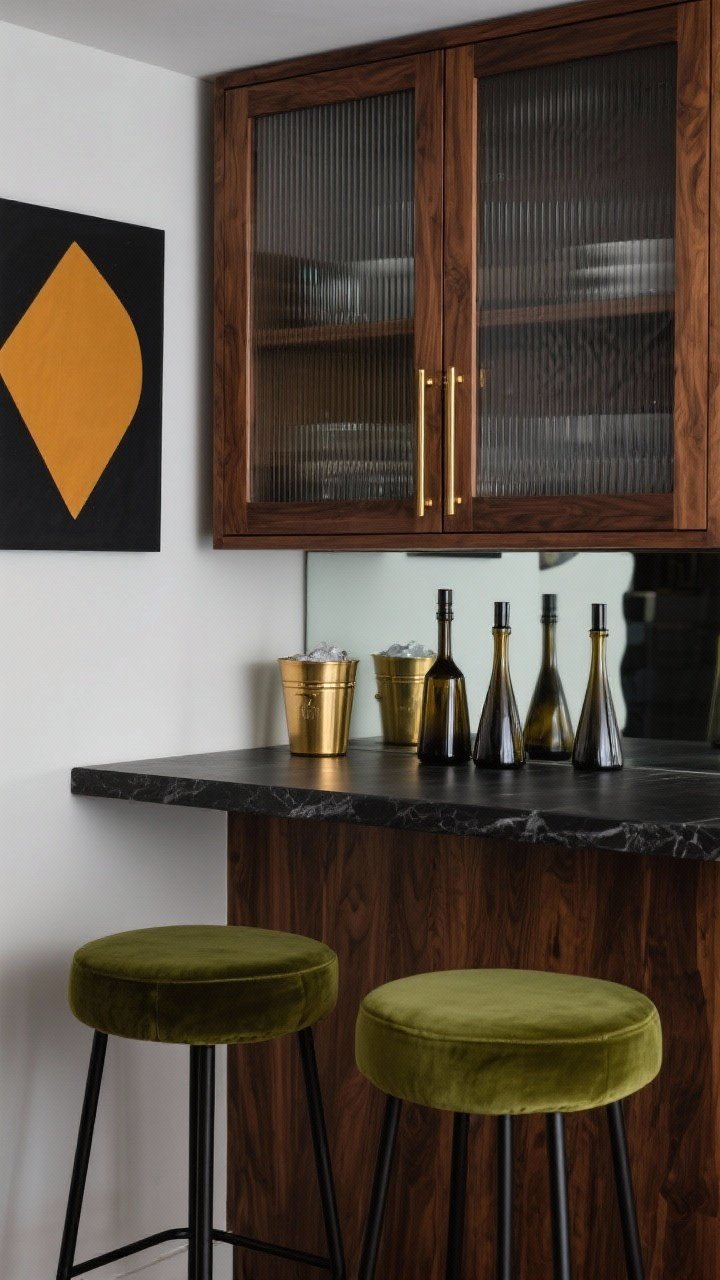
This design works as modern mid-century because it blends luxe finishes with streamlined furniture, turning a small footprint into a striking feature. Mid-century interiors often celebrated entertaining, and this home bar channels that spirit in a sleek, modern way.
-
Compact Cabinetry: A walnut wall cabinet with ribbed glass doors feels rich and textural while offering discreet storage. Ribbed and smoked glass were staples of mid-century design, reimagined here with a crisp, modern edge.
-
Functional Counter: A floating black stone counter adds drama while keeping the look minimal. Mid-century design often relied on simple, functional slabs of material to make a statement.
-
Luxe Seating: Olive green velvet stools with slim black metal frames nod to the era’s love of rich upholstery paired with slender, modern legs. The color choice ties the palette back to earthy, mid-century tones.
-
Reflective Backdrop: A smoked mirror backsplash layers depth and light, balancing the matte finishes of stone and wood. This subtle glamour was a mid-century trick to make small spaces feel expansive.
-
Curated Details: Angular decanters, a brass ice bucket, and graphic artwork in ochre and black introduce sculptural elements and playful contrast without clutter.
Key takeaway: With walnut, brass, smoked glass, and velvet accents, this bar is a modern mid-century moment that proves you don’t need a large space to create big style.
Spa-Calm Bathroom With Rounded Edges

This design works as modern mid-century because it uses clean lines, warm wood, and soft geometric shapes to create a space that’s serene yet stylish. Bathrooms in mid-century homes often balanced functionality with design-forward details, and this version carries that spirit into a spa-like retreat.
-
Warm Vanity: A rounded-edge oak vanity with knurled brass pulls grounds the room in natural warmth. Wood cabinetry was a hallmark of mid-century interiors, and here it’s softened for a modern, approachable look.
-
Curved Mirrors: Twin brass-framed oval mirrors keep the design simple but sculptural. Rounded forms like these were central to mid-century style, balancing all the straight architectural lines.
-
Balanced Tilework: Matte charcoal hex tiles on the floor add graphic texture, while vertical white zellige in the shower introduces subtle variation and shine. This mix of geometric and organic keeps the look crisp yet calming.
-
Signature Lighting: Globe sconces flanking the mirrors reinforce the era’s iconic lighting forms while adding an inviting, even glow.
-
Spa-Style Accents: Rolled ecru towels, amber glass bottles, and a stone tray create a boutique-hotel feel—layering in the thoughtful, functional styling mid-century design was always about.
Key takeaway: With warm wood, soft geometry, and classic globe lighting, this bathroom proves mid-century design can evolve into a calming spa-like retreat that feels both timeless and modern.
Quick styling cheat sheet to keep your modern mid-century rooms cohesive:
- Mix warm woods (walnut, teak, oak) with matte metals (brass, black).
- Keep lines clean and shapes sculptural—rounded corners, tapered legs.
- Use neutrals as a base; layer earth tones like moss, rust, and clay.
- Choose one hero piece per room: a globe pendant, a slat credenza, or a curved sofa.
- Let texture do the talking: wool rugs, linen drapes, leather accents, cane details.
Pick your favorite concept and start with two or three anchor pieces. Once those are in, the rest—lamps, art, and little moments—click into place. Which one are you trying first?
Bringing Mid-Century into Your Modern Life
Modern mid-century style works because it’s timeless at its core—warm woods, sculptural lines, and a balance of simplicity and texture. Each of these 12 ideas shows how adaptable the look can be, whether you want a moody conversation den, a breezy guest room, or a spa-like bathroom retreat. The key is choosing a few anchor pieces—like a walnut bench, a globe pendant, or a cane headboard—and letting them set the tone. From there, it’s about layering textures, lighting, and curated accents that feel personal to you.
Ready to bring this look home? Start with the room that excites you most and pick two or three key pieces to ground the space. For more inspiration, check out my guide on How to Add Art Deco Glamour Without Going Overboard or explore 25 Stunning Boho Floral Wallpaper Designs to Transform Your Space to mix in patterns with mid-century warmth.

